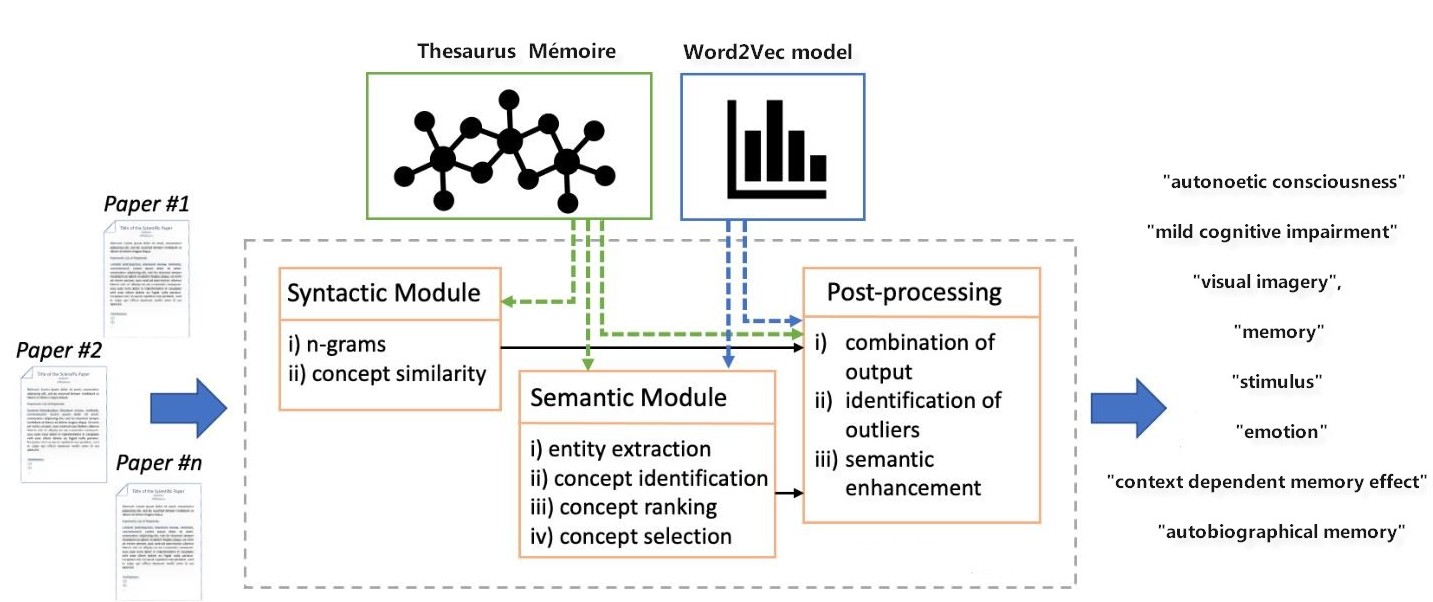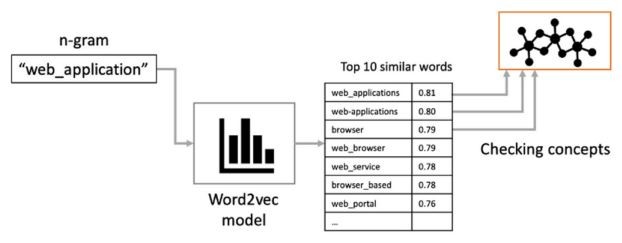
 GitBucket
GitBucket
| .. | |||
| data | 2 years ago | ||
| v1 | 1 year ago | ||
| README.md | 1 year ago | ||
| examples.http | 1 year ago | ||
| flow_test.py | 1 year ago | ||
| image.jpg | 2 years ago | ||
| image2.jpg | 2 years ago | ||
| indexer.py | 1 year ago | ||
| install_data.py | 2 years ago | ||
| requirements.txt | 1 year ago | ||
| swagger.json | 2 years ago | ||
kos2vec
Application d’indexation sémantique sur une ressource termino-ontologique (RTO)
Identification de concepts sur la mémoire basé sur une ontology et utilisant un modèle de langue
Principe de fonctionnement

Le système prend en entrée les métadonnées associées à un article (titre, résumé) et renvoie une sélection de concepts tirés du thesaurus mémoire. Il se compose de 3 modules principaux :
le module syntaxique analyse les documents d'entrée et identifie les concepts qui sont explicitement mentionnés dans le document.
le Module semantique extrait des candidats termes (cunking) et calcule la similarité de ceux-ci avec les nœuds de l'ontologie en tirant parti de l'intégration des mots dans un modèle Embedding. Il sélection des termes RTO directement présent ou proche voisin dans le modèle.

- le module de post-traitement combine les résultats de ces deux modules, élimine les valeurs aberrantes et les améliore en incluant les "super-concepts pertinents" (broader).
L'approche exploite une RTO de loterre et des plongements lexicaux calculés sur un corpus du domaine.
- Le modele de langue est de type Word2Vec et il construit sur un corpus Istex de 587.721 résumés annotés par les termes de la RTO et les ngrams les plus fréquents (collocation lexicale).
- L'Ontology mémoire provient du site Inist Loterre : https://skosmos.loterre.fr/P66/fr/
Utilisation
Sollicitation du WebService
/v1/{code_vocab}/index?indent=True
| nom de la ressource | Code_vocab | Sur loterre |
|---|---|---|
| memoire Psychologie | P66 | https://skosmos.loterre.fr/P66/en/ |
| MeSH | JVR | https://skosmos.loterre.fr/JVR/en/ |
| education | 216 | https://skosmos.loterre.fr/216/en/ |
| sociologie | 3JP | https://skosmos.loterre.fr/3JP/en/ |
| philosophie | 73G | https://skosmos.loterre.fr/73G/en/ |
| litterature | P21 | https://skosmos.loterre.fr/P21/en/ |
| SAGEThesaurus | SAG |
- Prend en entrée un flux json au format id/value :
[ {"idt":"11-0278198","value":"reduction fear child comparison positive information imagery control condition study... effect ... "}, {"idt":"07-0413881","value":"avoidance hemodilution selective cerebral perfusion neurobehavioral outcome ... "} ] - Produit en sortie un flux json contenant les résultats d'une indexation sur le thesaurus mémoire :
- "idt" : identifiant fourni en entrée
- "syntactic" : résultat de l'indexation syntaxique
- "semantic" : résultat de l'indexation semantique
- "union" : union des deux indexations
- "enhancement" : trace textuelle des indexations
- "explanation" : les concepts broader de tous les concepts trouvés
Exemple
cat <<EOF | curl --proxy "" -X POST --data-binary @- "http://kos2vec-01.tdmservices.intra.inist.fr/v1/P66/index?indent=True"
[
{"idt":"6GQ-2M7PJ87J-N","value":" Autonoetic consciousness refers to the ability to mentally transport oneself back in subjective time to relive elements of, or all, of a past event, and is compromised in the early stages of disease of Alzheimer (AD). Here, we investigate autobiographical memory (ABM) and the recollective experience in amnestic mild cognitive impairment ( aMCI ). aMCI participants exhibited significant deficits compared with healthy elderly controls for both personal semantic and event detail components of ABM. These decrements were evident across all life epochs for episodic recall . Recall of an event that occurred 1 week previously, was tested in the same spatiotemporal context, and provided the greatest group dissociation, with elderly controls benefitting from a context-dependent memory effect . This reinstantiation of context did not ameliorate the anterograde deficits in the aMCI cohort, nor did it facilitate the mental reliving of these memories for either participant group. Whereas reliving judgments were comparable in both groups, aMCI participants exhibited a compromised capacity to generate vivid, self-referential visual imagery and to re-experience the original emotion of events. These contextual and experiential deficits extended beyond recently encountered events into remote epochs, and suggest a greater level of ABM impairment in aMCI than previously assumed. The value associated with a stimulus as expressed on a continuum from pleasant to unpleasant or from attractive to aversive.6H6-1MZ40HDG-C"
},{
"idt":"6H6-2K1Z5BMH-L","value":" Abstract: In the Deese paradigm , studying a list of semantic associates (holiday, beach, etc.) produces false explicit memory for a nonpresented lure (vacation). Here, we examine false memory with implicit retrieval . Experiment 1 tested memory for lures and matched on-list targets, using stem completion (implicit) and stem-cued recall (explicit). We replicated McDermott's (1997) finding of implicit false memory at a 10-min delay, using better controls for explicit contamination. In Experiment 2, we show that this semantic priming is modality-specific (on the visual test, lure priming was reduced with auditory study of the semantic associates ), consistent with the perceptual nature of stem completion . In Experiment 3, additional study presentations reduced false memory with explicit, but not implicit, retrieval , consistent with suppression of gist-based responses by veridical information only when explicit retrieval is required. Results also dissociate implicit and explicit false memory and demonstrate similarities between false and true memories with implicit retrieval . "}
]
EOF
Citations
Salatino, A.A., Osborne, F., Thanapalasingam, T., Motta, E.: The CSO Classifier: Ontology-Driven Detection of Research Topics in Scholarly Articles. In: TPDL 2019: 23rd International Conference on Theory and Practice of Digital Libraries. Springer.